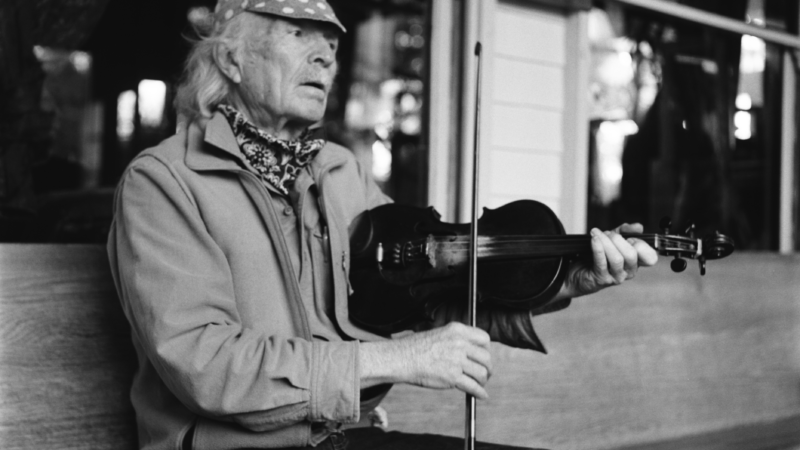Remembering Michael Hurley, a godfather of folk music’s underground
Michael Hurley did not want to end his week in Knoxville. The idiosyncratic songwriter and cartoonist had been coming to the East Tennessee city for decades, but his trip there over the last weekend in March for the sprawling music festival Big Ears had proven especially frustrating. A cancer survivor who had turned 83 three months earlier, he was so sick that he told Regina Greene, a longtime confidant who sometimes helped him book shows, that he couldn’t perform a full set.
At yet he did, twice. That Friday, he filled a church, cutting a gaunt figure as he shuffled onstage and asked someone else to plug in his guitar. He moved between traditional covers and winking originals, his voice sometimes rising for a cappella numbers to give his fingers a rest. On Saturday, the line snaked around the block to see him inside a tiny Scottish pub, the crowd mere feet away.
Otherwise, though, Hurley — a famous flirt and charismatic storyteller whom people often called Snock — mostly remained in his hotel room. When he had the chance to leave early on Sunday for a sold-out show on Monday across the mountains in Asheville, N.C., the forever peripatetic Hurley took it. Maybe that would be better? Hurley played for a few hundred folks that evening; on Tuesday he flew home to Oregon, and died that night.
Born in 1941, a proud native of Pennsylvania’s Bucks County who wrote his first song at 5, Hurley was only 22 when he released his debut, First Songs, on Folkways in 1964. Even then, he felt like some survivor of Old Weird America, some lingering vestige of the famed Harry Smith box set that Folkways had issued a decade earlier, pantomiming the part of a young singer. The New York Times panned it, but Folkways owner Moe Asch gave him an advance to make the second one in a studio, anyway. Hurley used the cash to pay his bills and never spoke to Asch again. “I was always very practical,” he told me in 2021, while I was writing about The Time of the Foxgloves for The New York Times. It was the last album he released during his lifetime. When he left Oregon for the East Coast last week, he was finishing the artwork for Broken Homes and Gardens, due this summer on No Quarter Records.
That playful pragmatism defined Hurley’s art. After a series of failed label deals, most notably with a Warner imprint owned by friend and Youngbloods leader Jesse Colin Young, he launched his own Bellemeade Phonics in the late ’80s. His lurid and funny original cover art — wolves getting wasted, wolves rowing canoes beneath a smiling sun, wolves cruising fast in classic cars — emblematized the uncanny worlds inside. What sounded at first like folk songs instead offered a way to sublimate reality, to recognize hard times and call their bluff with a laugh, a moan, some wine, or a strange story where the impossible suddenly seemed ordinary. At least for me, loving Michael Hurley’s songs meant hoping to move through the world with a smile so wry, a laugh so real, a grace so plain. As Will Oldham, but one member in Hurley’s legion of acolytes, told me: “The refrain is, ‘What would Michael Hurley do?'”
I had just started a very long walk in the woods early this week when the call came that Hurley had gone. I had seen him five days before, texting friends who knew of his ailments a photo, proof of life. I wallowed a little as I walked, then, sad that someone who always seemed so alive was now dead. I put on a Hurley album at random — a recent reissue of Sweetkorn, from 2002. It starts with the stories of a true itinerant’s travails, like crashing the van they called home into a poplar tree or stepping on a sewing needle that gets lodged in their foot for a month. “Got over it / Got over it / I had a hard time,” Hurley sings, his voice cracking into crumbs of falsetto. “But I got over it.”
I thought about him riding across the ridge to Asheville, trying to get over that hard time he’d had in Knoxville. I smiled and kept walking. Exactly, I thought, what Michael Hurley would do.
High-speed trains collide after one derails in southern Spain, killing at least 21
The crash happened in Spain's Andalusia province. Officials fear the death toll may rise.
United Nations leaders bemoan global turmoil as the General Assembly turns 80
On Saturday, the UNGA celebrated its 80th birthday in London. Speakers including U.N. Secretary-General António Guterres addressed global uncertainty during the second term of President Trump.
Parts of Florida receive rare snowfall as freezing temperatures linger
Snow has fallen in Florida for the second year in a row.
European leaders warn Trump’s Greenland tariffs threaten ‘dangerous downward spiral’
In a joint statement, leaders of eight countries said they stand in "full solidarity" with Denmark and Greenland. Denmark's Prime Minister Mette Frederiksen added: "Europe will not be blackmailed."
Syrian government announces a ceasefire with the Kurdish-led Syrian Democratic Forces
Syria's new leaders, since toppling Bashar Assad in December 2024, have struggled to assert their full authority over the war-torn country.
U.S. military troops on standby for possible deployment to Minnesota
The move comes after President Trump again threatened to invoke the Insurrection Act to control ongoing protests over the immigration enforcement surge in Minneapolis.







